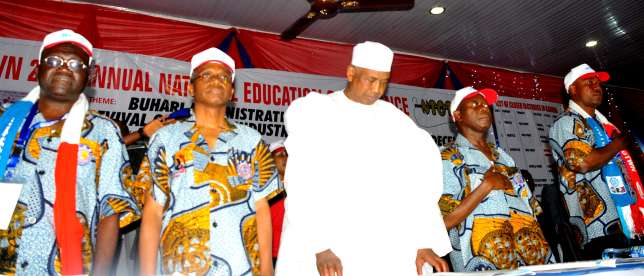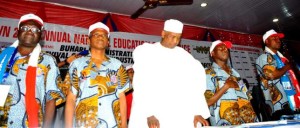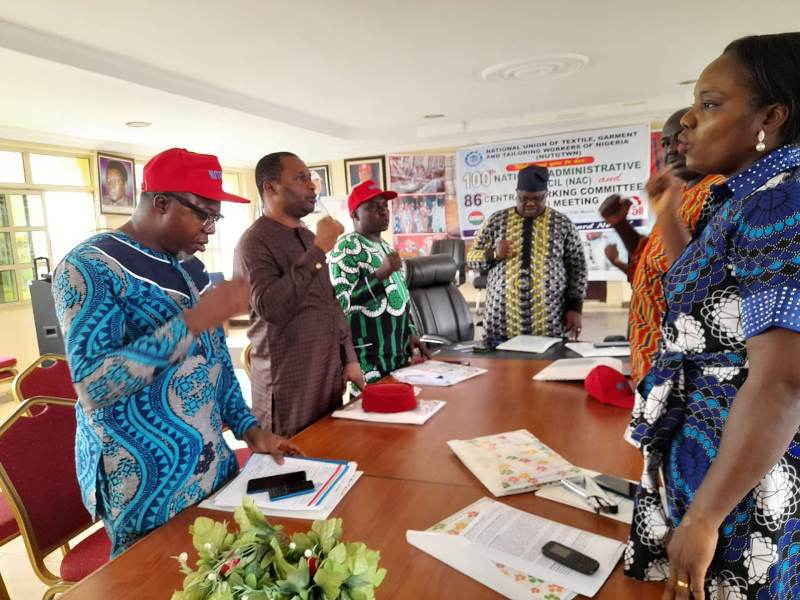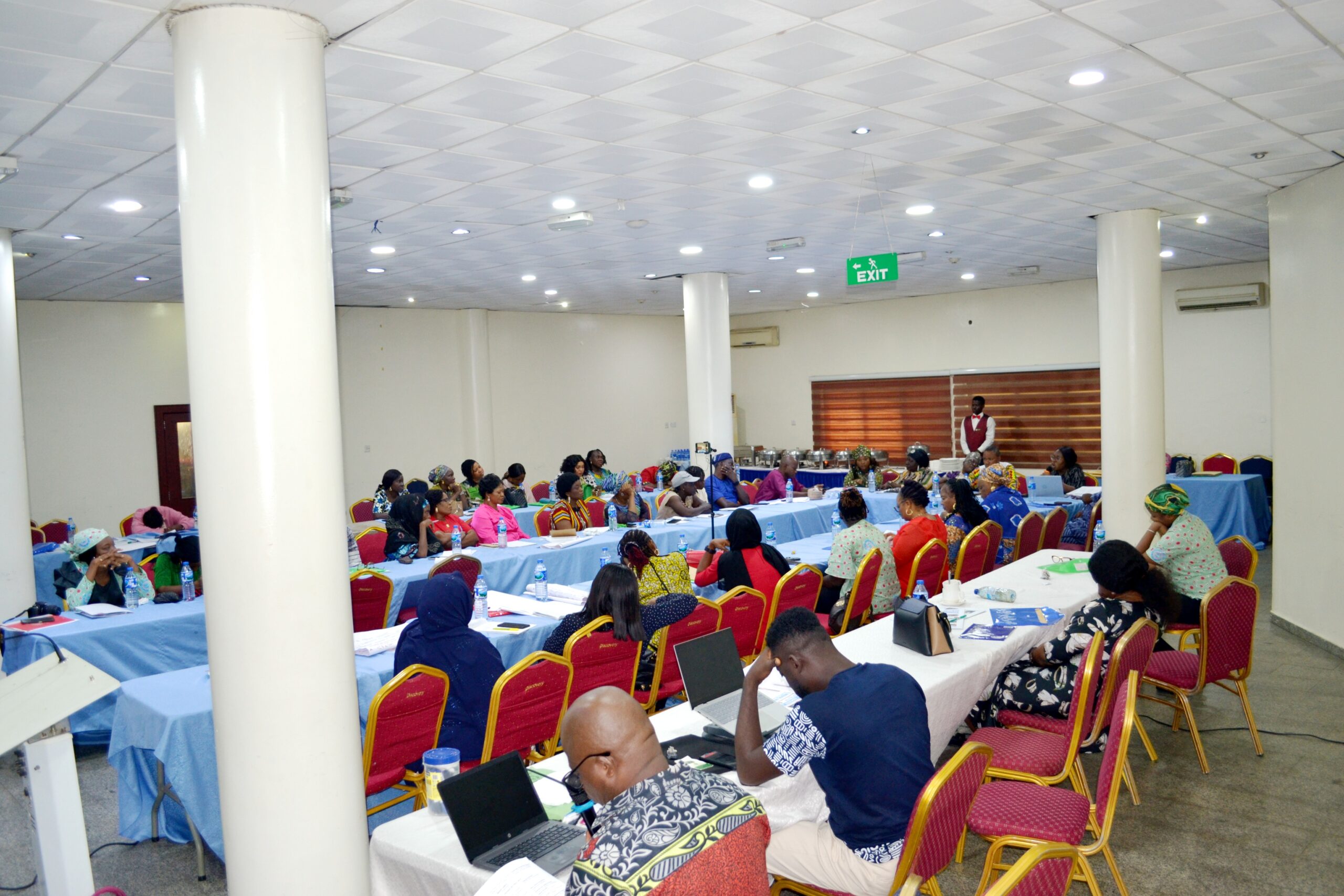
PROTOCOL
INTRODUCTION AND APPRECIATION
I join my comrade President, Comrade Oladele Hunsu to welcome you to the 27th Annual Joint Education Conference of our union.
KADUNA AS THE NATURAL CONFRENCE CITY
This is the 5th time this conference holds in the historic textile city of Kaduna. It held in 1992, 2004, 2008 and 2010. Special thanks to the past and present leaderships of the union and Textile Employers’ Association that have (close to three decades!) made the annual educational conference sustainable. Two people can write the story of this Education Conference. They are Comrade Adams Oshiomhole (former General Secretary of the Union and Governor of Edo State) and J.P. Olarewaju, immediate past Director General of Nigeria Textile Garment and Tailoring Employers Association (NTGTEA). Special thanks to the host Governor, Malam Nasir El Rufai, Executive Governor of Kaduna State for creating a secure environment and inspired confidence for over 500 participants (the highest so far!) to return to Kaduna for the Conference. Same appreciation goes to Alhaji Ismaila Isa Futua and Adams Oshiomhole, Governor of Edo State.
COST AND MASS PARTICIPATION
As at the last count, if we dis-countenance Naira devaluation and inflation, the union has spent as much as N.2 billion on 27 editions of the Education Conference. Over 5,500 participants have graduated from this “university of Textile workers” in the past 30 years. In the past five years, as part of our organizing efforts, there are new self-employed tailor participants drawn from different parts of the federation. government.
CHANGING ROBUST THEMES
The themes as usual cover core labour issues like collective bargaining, productivity, workers’ education, decent employment to industry issues such as Trade liberalization, wealth creation and industrial revival. We are also citizens not just production agents. To this extent, this annual conference has also offered platform to discuss governnace issues such as democracy, economic reforms especially during the military dictatorship.
IMPACT ASSESSMENT
Today National Union of Textile workers has through workers’ education produced and reproduced conscious and enlightened branch officers. This educational programme has also helped in building a formidable workers’ organization respected by its members, employers and government alike. It has also made us cultivate relationship cutting across the class divide.
2015 THEME; BUHARI ADMINISTRATION: REVIVAL OF TEXTILE INDUSTRY AND EMPLOYMENT CREATION
PAST GOVERNMENTS’ EFFORTS
Since the inception of democratic rule, from Obasanjo era to Jonathan era, because of the advocacy of the union, Federal governments have demonstrated interest in reviving the industry.
OBJ ERA; YEAR 2002
Year 2002 could very well be declared the year of textile revival. President Olusegun Obasanjo that year specifically devoted a whole weekend Forum to ‘TEXTILES’. The outcome was refreshingly optimistic and revolutionary in its proceedings, its revelations and its possible resolutions of the identified problems of textile industry. President Obasanjo at the Forum underscored the significance of textile industry. He vowed not to allow the industry to collapse so that we are naked. Faced with ‘naked’ statistics of factory closures then, by stakeholders, the President agreed as much that we are already being stripped ‘naked’ as the industry was on the verge of total collapse.
The President also announced a number of policy initiatives that included temporary suspension of importation of all fabrics to the country. With effect from 1st of September, the then Commerce Minister, Eng. Mustafa Bello announced the suspension of importation of African super and wax materials aimed at checking the sickening dumping of sub-standard and harmful prints to the country. A new certification arrangement was put in place to ensure that imported fabrics meet certain Nigerian standard in terms of price, quality and health of the citizenry. Genuine imports could only pass through two ports, namely, Apapa and Tin Can ports for verification by customs. Imports outside these ports were treated as contraband to be auctioned at 20 per cent of market value or be destroyed on account of sub-standard and harmful effects on human lives. The relevant agencies, namely Standard Organization (SON), Customs and FIIRO were to ensure compliance with the new policy. There was a Presidential Task Force headed by the then no-nonsense FCT minister, Mallam El-Rufai charged with apprehending smuggled textile fabrics and burning them. All these measures helped in halting the factory closures and even improving the capacity utilization of the existing survived factories.
YAR’ ADUA JONATHAN ERA
President Musa Yar Adua said his priority was economy, economy and economy. After much advocacy, the Yar’ Adua regime moved to implement 70 billion intervention fund launched by OBJ. It was however the Jonathan administration that finally endorsed the intervention fund under the cotton/textile revival plan. The new deal supervised by the then Vice President Namadi Sambo revolutionalized funding for the real sector and breadth life into the ailing industries. The deal worked out by the CBN and BOI covered lending and re-refinancing of projects, restructuring of existing portfolios to manufacturers and support for investment in industrial clusters power supply. The reopening of UNT Plc. in 2010 after three years of closure (with close to 1,500 direct jobs currently) was due to these cocktail of measures pushed by BOI, CBN and government. BOI under Ms Evelyn Oputu, lived to its motto; is “transforming Nigeria’s industrial sector”.
However all said, we can see the overall impact assessment of all the past efforts from the banners in this hall of closed textile factories.
2015 THEME
Our chosen theme this year is to help assist Buhari administration to consolidate on the few gains of the past, avoid policy mistakes of the past and above all revive all closed factories where past governments in spite of their efforts could not stop the free fall.
SUGGESTED POLICY MEASURES/SOLUTIONS TO THE REVIVAL OF TEXTILE INDUSTRY
NAME IT AND TAME IT
With all the acknowledged efforts of the past governments, they never made revival of textiles a campaign programme as president Buhari has done. It is commendable that Buhari administration named textile revival explicitly in his campaign promise. What we must do is what is being done.
Quotes
“I still recall with clarity that at some point, the textile industry in Nigeria was employing about 320,000 Nigerians. But today, the same industry employs less than 30,000 people and the factories operate below capacity or they are completely closed.
“I have made a promise to Nigerians that jobs will be created as part of efforts to revive the economy and that promise will be fulfilled. We will move as fast as we can to resuscitate the textile and mining industries, and also improve production in our agricultural sector…..we cannot allow industries and factories to close down. Instead, we should be making every effort to ensure that we re-open the closed ones and attract new ones to reduce unemployment.”
– President Muhammadu Buhari
“Reviving the textiles is a significant campaign promise of General Buhari and he is committed to it. Besides, Buhari lives in Kaduna and knows the impact of the textile industry on the economy. Kaduna used to be Manchester of the textile industry. We have met at forum of northern governors-elect and we have decided to ensure the revival of the textile companies. It is disgraceful that the largest economy in Africa imports textile materials from Senegal and other countries.”
– Mallam El-Rufai, Governor, Kaduna state.
We agree with President Buhari that the key to security is massive youth employment
VISIT THE CLOSED AND SURVIVING FACTORIES
AND SEE INTERNALLY ABANDONED FACTORIES (IAFs)
Visit the closed factories. Nigeria no doubt is right to seek for foreign direct investment. But what Nigeria needs urgently is to first reopen the existing closed factories. And this must start with direct factory visit. We applaud commendably Mallam El Rufai, the governor of Kaduna state for the historic visit to all the closed factories in Kaduna town and even our office on the 12th of May this year after he was elected and well before he assumed office.
Africa Industrialization Day is celebrated on November 20 every year as declared by United Nations Development Organizations (UNIDO). On this day, governments and other real sector organizations in many African countries examine ways to stimulate Africa’s industrialization process. It is also an occasion to draw worldwide media attention to the problems and challenges of industrialization in Africa.
I suggest that as part of the activities in Nigeria this year all state governors, both the President and the Vice President, all 500 plus legislators must be encouraged to visit closed factories. In particular, it will even be nice for our dear Comrade Governor to return back to those factories where he once collectively bargained for the workers with strikes now on permanent investment strike.
I suggest that beyond integrity and accountability, the real sense of responsibility or lack of it of elected officials must be measured in terms of their commitment (or lack of it) to the re-opening of all closed factories in Nigeria. We must halt the existing de-industrialization of the country.
INDUSTRY MATTERS
The importance of industry cannot be over-emphasized. Our government should realise that oil and gas and the new entrants; solid minerals are exhaustible resources. The key to real transformation and economic recovery lies in manufacturing. Nigeria has no business in alleviating poverty when it can and should generate wealth by increasing domestic capacity utilization through protection of industry.
I agree that private sector is the engine of growth. But as we have seen world wide, the real lubricant of this engine remains the government.
STOP SMUGGLING; WE NEED CREATIVE DESTRUCTION
Our solidarity song says “We can bring to birth a new world from the ashes of the old. The bane of the industry is unfair competition from India and China reinforced by smuggling made possible by 152 land smuggling routes (Customs says it is actually 149 routes as of 2002).
REWARD AND SANCTIONS FOR CUSTOM
The challenge lies in how to motivate the custom men and women to ensure compliance. The custom seems to look the other ways in the past such that smugglers literally overrun the economy without declaration of war. Let government equip the custom and provide generous incentives to motivate confiscation of the contraband. We must treat smugglers as insurgents who are destroying thousands of life.
NO INDUSTRIALIZATION WITHOUT ELECTRIFICATION
– There should be uninterrupted electricity in Africa.
PROTECT YOUR INDUSTRY; PUBLIC HEARINGS ON STATE OF INDUSTRY
– There should be public hearings of the relevant committees of the two Houses about the state of the industry. We must protect our industry.
– If there is the will, there will be the way..Funtua textile mill
– We must celebrate Alhaji Isa and Mamman Daura for protecting Funtua Textiles.
The reversal of industry’s fortunes started in 1997, when without consultation with industry’s operators, Abacha dictatorship lifted a ban on imports without pre-conditions. That singular arbitrariness underscores why dictatorship is bad for enterprise and development.
WHAT IS GOOD FOR EUROPE IS GOOD FOR AFRICA
Europe and America developed on the tripod of agriculture, construction and textile. Even after they have moved to high-tech industry, they still jealously hold on to these industries through protective measures of different dimensions because they are also central to employment creation and security. In Bangladesh alone, as many as ten million people are employed in textile sub-sector. The fourth and the last challenge is enforcement. The country is tall on policy, but they are more in the breach than observance.
NEED FOR INDUSTRIALIZATION
Industrialization assumes a special importance in development given its importance in the transformation of the economy through production of goods and services, employment generation and poverty eradication.
Industrialization is at the heart of development discourse.
If goods produced are not broadly distributed, among the population, we can only talk of economic growth. However if the goods meet the basic human needs of a large percentage of the population, industrial growth can then be said to be accompanied by development. The advantages of industrialization include lessening of dependency on imports, employment creation and saving scarce foreign exchange.
PATRONIZE MADE IN NIGERIA
Nigeria products are not inferior. They are of good quality. Many Nigerian textile mills have won national and international quality awards. Government should patronage Made-in-Nigeria textiles for uniforms for schools, Military and para-Military organisations. The key to reduction in prices of domestic fabrics does not lie in exposing domestic products to unfair imports but in lowering domestic cost of production by providing cheaper and efficient infrastructure and initiating industry-friendly policies such as reduction of interest rate among others.
BUHARI MUST BE OUR NIGERIA’s NEW SARDAUNA AND LEE KWAU YEW
The President deserves commendation for restoring the activist developmental role of the state.
India subsidises its long dated industry through reduced energy tariffs and generous export incentives that made Indian products undersell Nigerian products at landing costs. Indeed India has a programme tagged as ‘Focus on Africa’ with a view of dumping its relatively cheaper goods.
BEYOUND TEXTILE; WE SUPPORT THE CHANGE AGENDA
THINGS ARE FALLING IN PLACE
There is a popular saying that “Precious things come in small packages”. Since inauguration on May 29th, President Muhammadu Buhari has made some significant precious moves in the direction of good governance in the areas of security, economy and anti-corruption.
Economy
We commend and support measures by the Federal government to reduce cost of governance. We acknowledge the notable sense of sacrifice by President Muhammadu Buhari and Vice President Yemi Osinbajo through reduction of their pay by 50 percent.
We call on the Members of the National Assembly to follow in the foot step of Mr. President and Vice President. N130 billion for 500 legislators is NOT acceptable.
We also commend President Muhammadu Buhari for resisting the pressure to remove subsidy on petroleum products.
The President should rather deal with the problem which is corruption in subsidy management. We should not throw away the baby with bad water; accept the baby and throw away the bad water. There is nothing inherently bad with subsidy, what is bad is subsidy mismanagement. President Buhari has shown that there is no substitute for good governance. We must encourage him.
FIX REFINERIES
We commend the Federal government’s effort to fix the refineries. It is remarkable that some of the nation’s refineries are now working.
We support the Presidential directive on a Single Treasury Account (STA) for all Federal revenues to ensure greater probity, transparency and accountability in the collection, disbursement and utilization of national funds.
We demand the recent call by the Nigeria Extractive Industries Transparency Initiative (NEITI) for the recovery of over $7.5bn (N1.4tn) from oil and gas companies operating in the country should be taken seriously by the Federal government. Labour will partner with Federal government to stop cases of underpayment and under-assessment of taxes, royalties and rents revealed by NEITI in its independent audit reports on the industry.
Labour Friendliness – bailout arrangement for States to settle arrears of salaries.
We also commend the effort to bring back National Carrier.
Security
We acknowledge the progress that has been made to address insurgency in parts of the country.
We commend the Federal government’s decision for relocation of command structure to Maidugiri and commend the Service Chiefs for their loyalty and prompt compliance.
We commend the new multinational force to fight insurgency in the region which Nigeria is playing the leading role.
Labour will continue to support and partner with the Federal government’s effort to put an end to insurgency in the country and sub-region.
Anti-Corruption
More than ever before, President Muhammadu Buhari is naming, shaming and damning corruption. Not long ago former President Jonathan was being unhelpfully academic with corruption saying among others that stealing is not corruption.
We also commend the work of the National Economic Council, NEC, bi-partisan Adhoc Committee on the Management of Excess Crude Account Proceeds and Accruals into the Federation Account, headed by the Governor of Edo State, Mr. Adams Oshiomhole and Malam El Rufai.
LABOUR AGREES
Labour agrees with President Buhari that Nigeria has to break this “vicious cycle” of corruption unemployment and insecurity in Nigeria before we can make progress”. All Nigerians are therefore enjoined to support the government in this war against graft, which is the root of all woes including senseless violence engendered by poverty.
LABOUR SUPPORTS BUHARI
Labour support the statement credited to His Eminence, Alhaji Mohammed Sa’ad Abubakar III mni, Sultan of Sokoto that all those found guilty of corruption should not only have their entire assets seized or and forfeited to government but also face jail sentences.
The courts should also be empowered to prosecute fund offenders.
HAPPY LABOUR IS ALSO UNITED NOW
Commend Comrade Governor Adams Oshiomhole and other trade union veterans for their effort.
THINGS THAT ARE STILL FALLING APART
NAIRA VALUE
FACTORY CLOSURE AND UNEMPLOYMENT – Future is in Industrialisation
ABSENTEE LEGISLATORS
BUSINESS AS USUAL PUBLIC OFFICERS
INTERNALLY DISPLACED PERSONS









